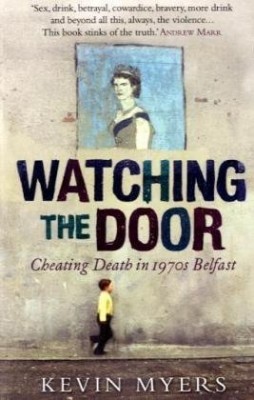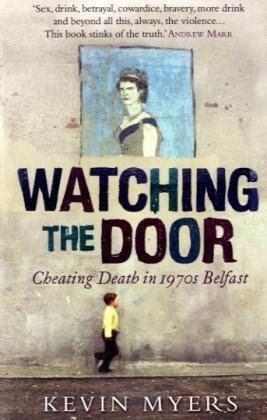 This reads as if a mad picaresque tale. Myers as first a reporter for RTÉ and then as a freelance journalist with no real experience, finds himself wandering into savagery as he hastens north as the Troubles explode. A soldier dies next to him; he witnesses an IRA ambush; he sees children shot to death by snipers. The adjectives pile up: the conditions in 1970s Belfast lead to a life led as lies. ‘Insane, vile, ludicrous, preposterous’ characterise what happens to everyday situations turned into hidden truths, revealed only behind one’s own doors, to one’s own ‘Catholic’ tribe.
This reads as if a mad picaresque tale. Myers as first a reporter for RTÉ and then as a freelance journalist with no real experience, finds himself wandering into savagery as he hastens north as the Troubles explode. A soldier dies next to him; he witnesses an IRA ambush; he sees children shot to death by snipers. The adjectives pile up: the conditions in 1970s Belfast lead to a life led as lies. ‘Insane, vile, ludicrous, preposterous’ characterise what happens to everyday situations turned into hidden truths, revealed only behind one’s own doors, to one’s own ‘Catholic’ tribe.
Not that the British troops, their commanders, the loyalist paramilitaries, the nutting squads escape opprobrium. ‘Everyone in Northern Ireland lied. Everyone, without exception: republicans, loyalists, soldiers, police–everyone. Lying is easy in such a place. It is the default mode to which everyone turns when there is no consensus about truth. In the absence of an agreed reality, truth is whatever you’re having yourself’. (117-8) Myers names the victims, and makes us watch as they die. He tallies forty people he knew who died in the North, and another eight he did not, but whom he watched die. We like him are forced to remember how statistics cloak murder, and how anguish shatters those left behind.
As the decade and the Troubles grind on, Myers loses his bearings. He struggles to find work, to keep girlfriends (although he beds an impressive number), and to stay sane amidst the ‘exonerative moral machinery’ which grinds down his resistance to republican rhetoric and unionist idiocy. The cant of their volunteers and the endlessly one-sided recital of their woes disgust him. ‘For immunity-to-consequence was both a by-product of the Troubles, and its fuel, rather as a nuclear reactor can run on its own waste’. (230)
Still, Myers for all his acerbic contempt fills the narrative with vivid reportage from his perspective, starting with the Shaws Road ambush he tape recorded after he stumbled upon its IRA setup, and continuing into Robert Bankier’s last breath as a British soldier, the final moments of Rose McCartney and Patrick O’Neill at the hands of loyalist killers, and a bomb attack Myers narrowly misses meant for that ‘deeply manipulative’ republican apologist to “revolutionary tourists”, John McGuffin. Myers provides abundant tragedy, danger, and narrow escapes.
Luckily, he intersperses happier tales. His best, such as Lady Henrietta Guinness meeting the consumers of her family’s stout in West Belfast’s pubs, combine a poignant moment with a satirical relish for the absurd that all too often became the ordinary. He loves relating his two escapades when the man of the house returned and Myers had to hide from the cuckold; his visit to his friend Barney’s brothel, surely the least successful in all of Ulster, represents a comic triumph. My favorite episode, near the end of this often dispiriting narrative, managed to lift my spirits. His hosting of Shannon, an utterly unspeakable American feminist, who befuddles Myers with her contradictions, as a splendid set piece succeeds.
His memoir confronts his own complicity as a journalist who becomes too intimate with those who he meets, for England-born Myers looks back upon his own compulsion to mix with the natives turned friends, lovers, and neighbors. Everyone talks to him, but Myers learns that half-truths fill their admissions. He is never trusted enough by any side.
This malignant maelstrom before decade’s end spun him out of the province, as he tried to escape the degradation that corroded his professional career and personal life. As I finished, I wondered what he learned, for the back cover tells us he went on to cover civil war in 1980s Lebanon and 1990s Bosnia.
California-born. Irish parentage. Teaches humanities. Reviews widely. Reads often.
Discover more from Slugger O'Toole
Subscribe to get the latest posts to your email.
